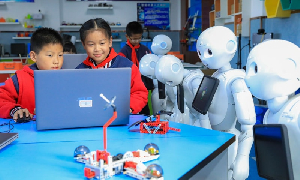This blog is managed by the content creator and not GhanaWeb, its affiliates, or employees. Advertising on this blog requires a minimum of GH₵50 a week. Contact the blog owner with any queries.
Ted News Ghana Blog of Wednesday, 9 April 2025
Source: TEDDY VAVA GAWUGA

In a major push to lead the global race in artificial intelligence (AI), China has announced plans to roll out AI education across its primary and secondary schools starting September 1, 2025.
Under the new initiative, students will receive a minimum of eight hours of AI instruction each academic year. Schools will have the flexibility to either integrate the lessons into existing subjects or introduce AI as a standalone course.
Younger students at the elementary level will explore foundational AI concepts through hands-on activities and interactive learning. In middle school, the curriculum will expand to cover real-world applications of AI, while high schoolers will study more complex topics and explore AI-driven innovation.
This move forms part of China’s broader ambition to become a global leader in AI. By embedding AI education into the school system at an early age, the country aims to equip its youth with future-ready skills that can drive technological advancement.
China’s Minister of Education, Huai Jinpeng, emphasized that AI is reshaping the technology landscape and creating transformative opportunities in education. He also announced plans to release a comprehensive white paper later in 2025, outlining China’s long-term strategy for AI education and development.
China isn’t alone in this effort. Other nations are also making strides in AI education. For instance, California has enacted legislation to include AI in its school curriculum, and Italy is currently piloting AI tools to enhance digital literacy in classrooms.
With countries across the globe recognizing the critical role of AI in shaping the future, China’s proactive approach reflects a strong commitment to preparing the next generation for an increasingly AI-driven world. The upcoming white paper is expected to provide deeper insights into the nation’s vision for integrating AI into its education system.


